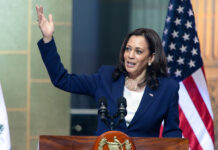
In a revelation that has sparked widespread concern, the current administration has acknowledged the surveillance of private financial transactions of American citizens. This surveillance program targeted specific keywords such as ‘MAGA’, ‘Trump’, and ‘Kamala’, following the tumultuous events of January 6th. The disclosure of this information has led to an uproar among privacy advocates and citizens alike, who see this as a gross invasion of personal liberties.
The surveillance initiative was brought to light through a letter from the Treasury Department, which indicated that ‘Exchange events’ began shortly after the January 6 incident under the previous administration. This letter was in response to inquiries made by Senator Tim Scott, a member of the Senate Banking Committee, who expressed grave concerns about the violation of Americans’ privacy and the targeting of U.S. citizens without due process.
You're being watched, monitored and entered into a government data base
Treasury confirms terms like 'MAGA,' 'Trump,' Kamala,' 'Biden' used in private bank transaction searcheshttps://t.co/HJ1FDmtmaT
— ann (@4rivergirl) February 9, 2024
Senator Scott, who had supported the Anti-Money Laundering Act of 2020 aimed at preventing money laundering and terrorism financing, was taken aback by the extent of the surveillance. The Act facilitated the sharing of data between law enforcement and financial institutions through the FinCEN Exchange program. However, the recent findings suggest that the program may have been used to monitor activities far beyond its intended scope.
Documents uncovered during a House Judiciary Committee and Subcommittee on Weaponization of the Federal Government investigation revealed that financial institutions were advised by FinCEN to filter records using certain keywords. Astonishingly, these included benign activities such as the purchase of religious texts like the Bible and media subscriptions deemed to contain ‘extremist views’.
Breaking news: TREASURY CONFIRMS TERMS LIKE "MAGA,' 'TRUMP,' USED IN PRIVATE BANK TRANSACTION
Marjorie Taylor Greene: This is absurd pic.twitter.com/wa08wZWfia
— 1776 (@TheWakeninq) February 10, 2024
The breadth of the surveillance raised alarms when it was discovered that even everyday transactions could have placed citizens under scrutiny. Judiciary Chairman Jim Jordan highlighted the absurdity of the situation with hypothetical examples, suggesting that buying a Bible or shopping at certain stores could flag an individual to the federal government.
The terms ‘MAGA’ and ‘Trump’ were also reportedly suggested by the department to be searched in Zelle payments, according to the report released by Chairman Jordan. This has led to accusations of political bias and the misuse of surveillance powers to target individuals based on their political affiliations or personal interests.
Treasury Secretary Janet Yellen has since stated that she would investigate why the department sent instructions to banks on how to search Americans’ transaction records. This statement comes as little consolation to those who feel their trust in the government’s respect for privacy has been betrayed.
The controversy surrounding this surveillance program is a stark reminder of the delicate balance between national security and individual freedoms. As the debate continues, many are calling for transparency, accountability, and safeguards to ensure that such overreach does not occur in the future. The administration now faces the challenge of regaining public trust while upholding the principles of privacy that are foundational to the American way of life.










